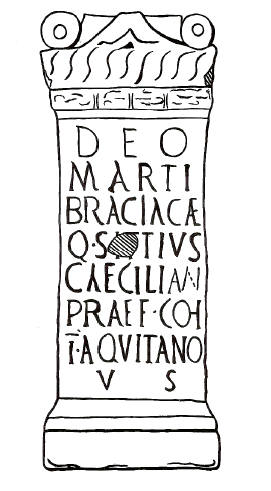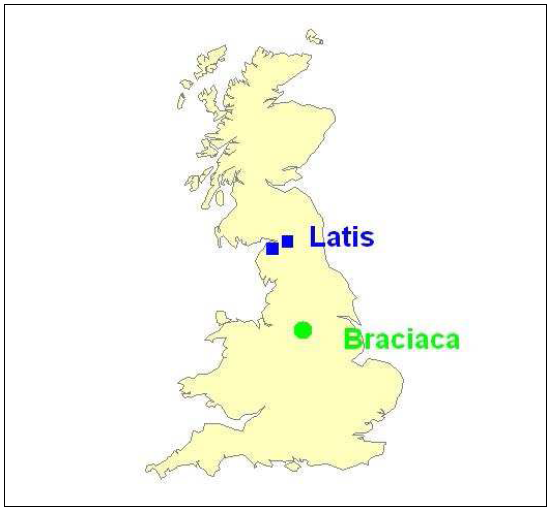b) Braciaca(‘Beer Goddess’)
A military inscription engraved on a gritstone altar, discovered in 1695 in the grounds belonging to Haddon Hall near Bakewell (Derbyshire), associates the Roman war-god Mars with an indigenous theonym, Braciaca: Deo Marti Braciacae Q. Sittius Caecilianus, Praef. Cohors I Aquitanorum, ‘To the God Mars Bracacia, Quintus Sittius Caecilianus, prefect* of the First Cohort of Aquitanians, fulfilled his vow’ (fig. 13).2358
Most scholars, apart from Olmsted, regard Braciaca as being a local indigenous ‘epithet’ for the god Mars and conclude that Braciaca is a god.2359 And yet, Braciaca seems to be a feminine name, since a-endings are generally names of goddesses: Sequana, Aventia, Bricta, Icovellauna or Nemetona, while names of gods usually end with -us (-o in the inscriptions) or -is/-ix (-i in the inscriptions): Demioncus Apollo (Apollini deo Demionco), Danuvius (Danuvio), Entarabus (deo En[t]arabo), Randosatis Mars (Marti Randosati), etc. In terms of epigraphy, it would appear that, if Bracacia had been a god, its name in the British inscription would have been: Deo Marti Braciaco or Braciaci, giving Mars Braciacus or Braciacis. Moreover, it is not rare in inscriptions to find the names of a god and a goddess placed side by side without the coordinating conjunction and. Thus, the inscription should perhaps be read: Deo Marti [et] Braciacae, ‘To the god Mars and to (the goddess) Bracacia’.

Lambert explains that Braciaca is not to be understood exactly as a divine name but possibly as a localizing epithet in -iaco, parallel to the formation, referring to a place or domain belonging to somebody.2360 Like Rosmertae Dubnocaratiaci is ‘Rosmerta from the place known as Dubnocaratiacum’, that is ‘the property of Dubnocaratius’,2361 the epithet Braciaca could be interpreted as ‘the goddess from the place called Braciacum (?)’, that is ‘a place owned by Bracius’; but the supposed place-name is open to other interpretations. This etymology is likely but not absolutely certain, for, compared with Gaul, there are very few occurences of localizing epithets in Britain.2362
The name Braciaca may also be related to Gaulish bracis, which signifies ‘malt’ or ‘grain used in beer brewing’. According to Pliny, braci was the Celtic name for a variety of cereal (barley?) used in the preparation of malt and the brewing of beer, called ‘cervesia’ or ‘curmi’.2363 The Gaulish word bracis is similar to Welsh brag, ‘malt’, Old Cornish brag, ‘bratium’, Breton bragez, ‘wheatgerm’, Old Irish mraich, braich, ‘malt’, ‘wort’ (< *mraki-), and Galician émbrekton, ‘kind of beverage’.2364 The French word brasser, ‘to brew’ comes from the same root (< *braciāre). Therefore, Braciaca may mean ‘Goddess of (malt-induced) Intoxication’ or ‘Goddess of Beer’. If this etymology is correct, she may have been closely linked to the cultivation of cereals and the brewing of beer or other local fermented drinks, which she personified, protected and purveyed to her people. She can thus be seen to be closely related, in function, to the other goddesses of intoxication, such as Latis, Medb, Meduna and the Comedovae. Even though this etymology remains conjectural, it is at any rate an interesting hypothesis, for intoxication seems to have been mainly linked to female deities in Celtic times.
The names of Irish Medb, Gaulish Meduna and Comedovae (‘the goddesses of mead-intoxication’), and of British Latis (‘Ale’) and Braciaca (‘Beer Goddess?) evidence that the tradition of goddesses purveying alcoholic drinks was important and common to the various Celtic peoples from Ireland, Britain and Gaul. The fact that three goddess names refer to mead-intoxication is not insignificant. It tends to prove that mead was a sacred beverage in Celtic times, consumed within the context of religion. Before considering in detail the archaeological and Irish literary data evidencing the consumption of mead within ritual contexts, it is necessary to explain why mead was envisaged as a sacred drink pertaining to the sphere of the divine and conferring immortality of the soul.
